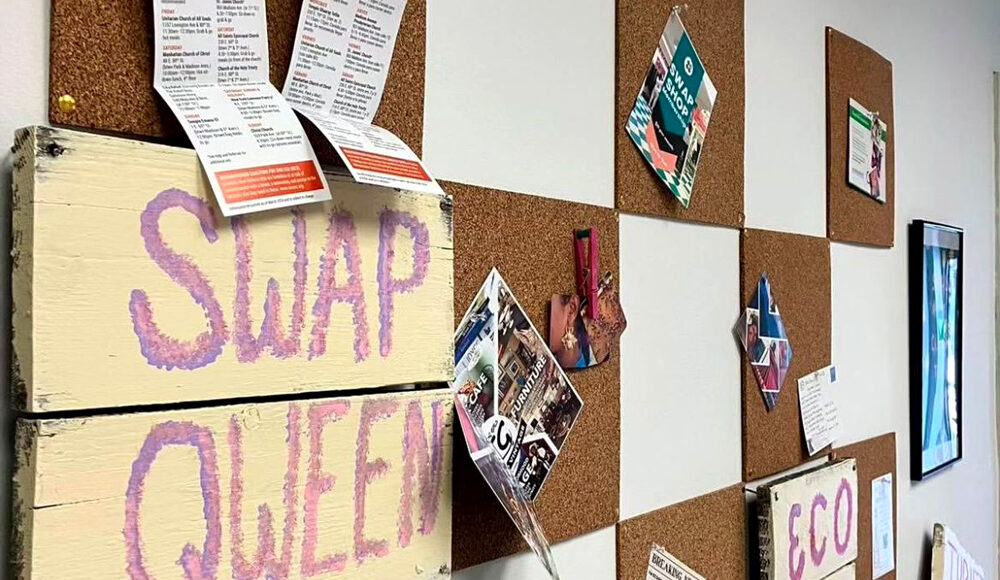By Josthyn Ramos
The Sustainable Fashion Community Center (SFCC) began as an initiative by the New York City Fair Trade Coalition (NYCFTC) that aimed to bring its beliefs about sustainability into a tangible space where people could interact with, learn about, and practice sustainability. The SFCC opened between 111th and 112th Streets on Lexington Avenue focused on reducing textile waste through a clothing swap system and operated entirely on donations. Anyone could drop off clothing during operating hours, and volunteers evaluated the items to determine whether they could be resold or needed recycling. Items set aside for recycling were picked up by partnering organizations such as Helpsy, FABSCRAP, and Eileen Fisher, which upcycled the textile pieces. These collaborations ensured that unswapped textiles were recycled responsibly, contributing to broader citywide efforts to combat textile waste.
Initially, participants paid $15 to swap 10 items they donated for 10 items left behind by other donors. During one Earth Month, the center experimented with a $1-per-item swap system, which significantly increased traffic, donations, and overall engagement. This adjustment opened doors for East Harlem residents, providing them with affordable clothing, a responsible means to dispose of textile waste, and opportunities to volunteer. The new system proved too successful to be changed and became a permanent feature.
In addition to hosting swaps, the center offered workshops on repairing and upcycling textiles, equipping residents with practical skills to extend the lifespan of clothing and foster creativity. Volunteers played a crucial role in the center’s operations and gained leadership opportunities, with many applying their newfound knowledge to personal projects or local initiatives.
Historical Context: The Systemic Neglect of East Harlem
East Harlem has historically been a neighborhood neglected at a systemic level. Since the days of redlining, the area has suffered from governmental inaction, leaving its residents without access to programs and resources that encourage development. This neglect has caused East Harlem to fall behind other neighborhoods in New York City, particularly in Manhattan. East Harlem, in particular, has faced environmental and industrial challenges that continue to impact the community. Factories emitting harmful chemicals and the lack of adequate recycling facilities have compounded the neighborhood’s struggles. East Harlem has the highest percentage of asthmatic residents compared to other Manhattan neighborhoods, a direct result of its proximity to hazardous waste. The SFCC had the tools to address these issues by providing resources, advocating for systemic change and awareness, and helping track down the root causes of these challenges.
Over its three-year run, the center expanded its offerings, hosting events that educated the public on issues such as textile waste and corporate greenwashing. It also provided incubation space for small businesses to showcase their products and organized community gatherings where participants could connect over shared meals. Additionally, the center collaborated with nearby high schools, such as Bronx Science, to offer students opportunities to complete their volunteer hours while broadening their understanding of textile waste. These initiatives left a lasting impact on the neighborhood. For many residents, the $1 clothing system was transformative, offering homeless individuals access to warm clothing for winter or attire for job interviews, helping them take meaningful steps toward improving their lives.
Through the people involved, the SFCC became more than just a $1 thrift shop—it transformed into a haven for anyone in need of support. Both physically and emotionally, people often found themselves coming to the center to be heard or to confide in someone, and the staff and volunteers provided just that.
Irene Rivera has been regularly volunteering at the SFCC for over three years and spoke about the organization:
Challenges and Future Prospects
Despite its success, the center faced significant challenges. The donated space it operated from was unexpectedly leased to another business, giving the SFCC only three weeks to vacate. Fortunately, The People’s Church, just a step down on Lexington Avenue, offered temporary space, allowing the center to continue operations for six months. However, this arrangement was not permanent, and the SFCC now finds itself without a home yet again.
The $1 system cannot support the center if it must cover typical rent or business expenses, but changing this system would remove its most central service: accessible clothing. This predicament has forced the center into a state of hibernation, hoping to continue its mission of sustainability and community engagement by obtaining grants, fundraising, and returning stronger with new programming aimed at improving Harlem—hopefully by this coming spring.
After the news was shared with some of the center’s regular customers, we asked them a few questions, and this is what they had to say:
Call for Support
If you are interested in donating or want to get involved in bringing the SFCC back—and have expertise in fundraising—you can help by connecting with them through their social media or website, linked here:
Website: NYCFTC.com
Instagram: nycfairtrade
Facebook: NYC Fair Trade coalition
Eventbrite: NYC Fair Trade Coalition



